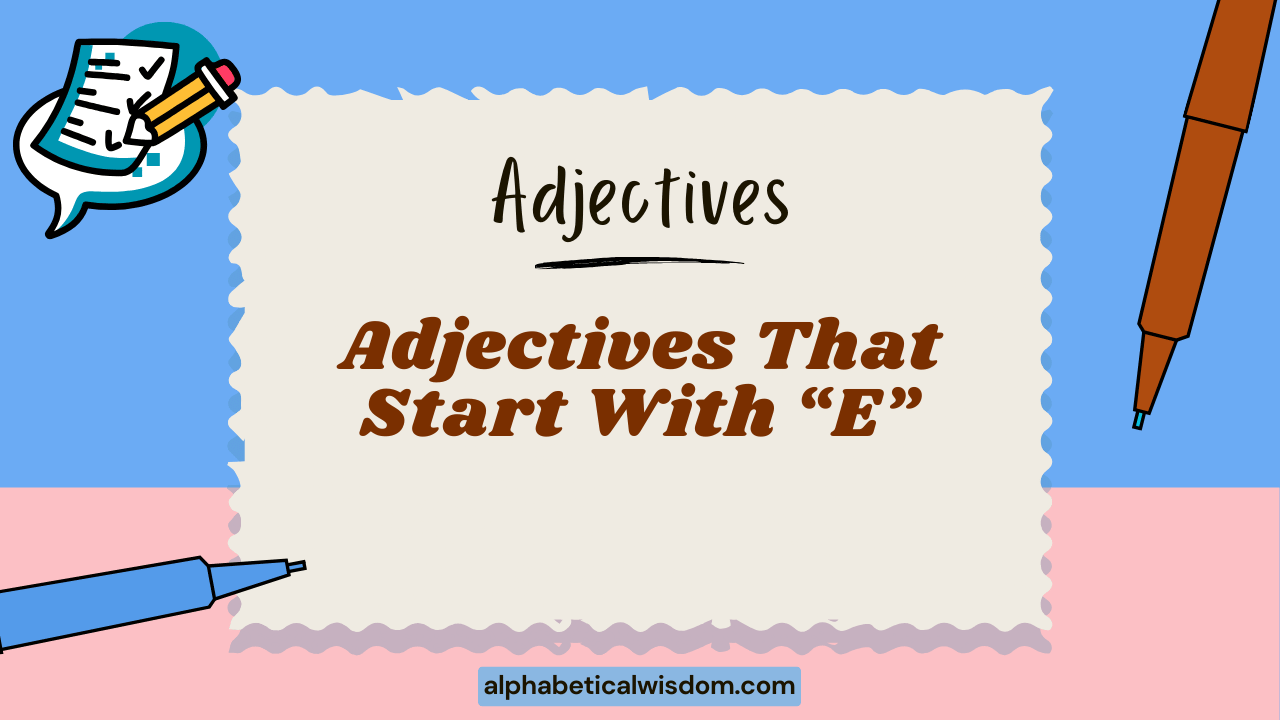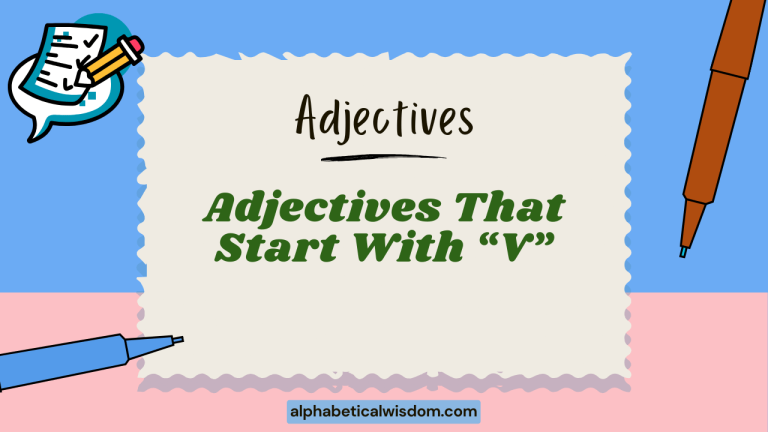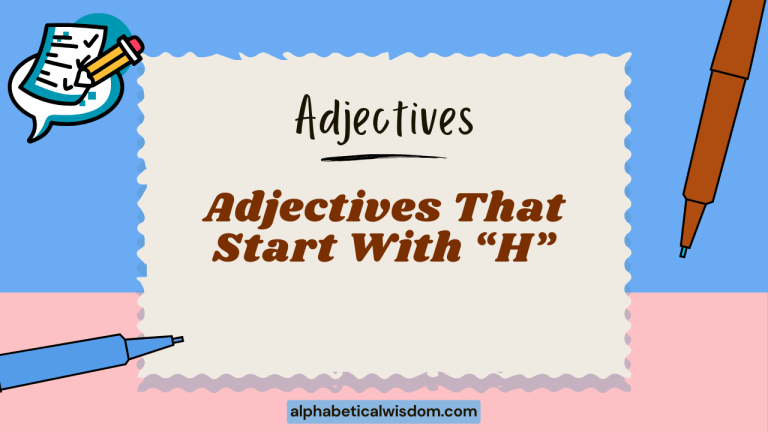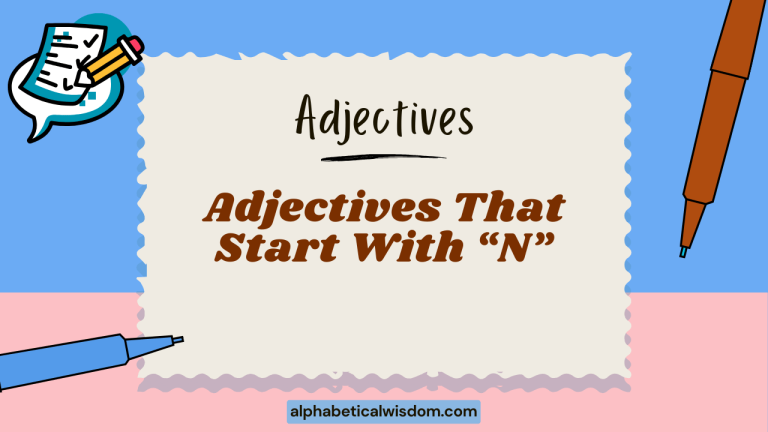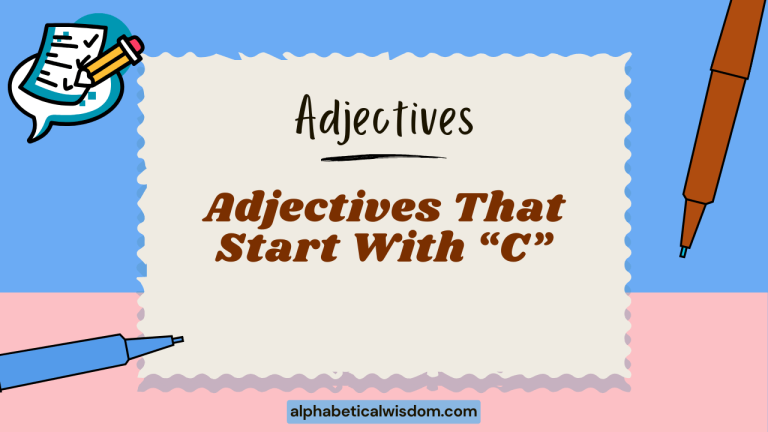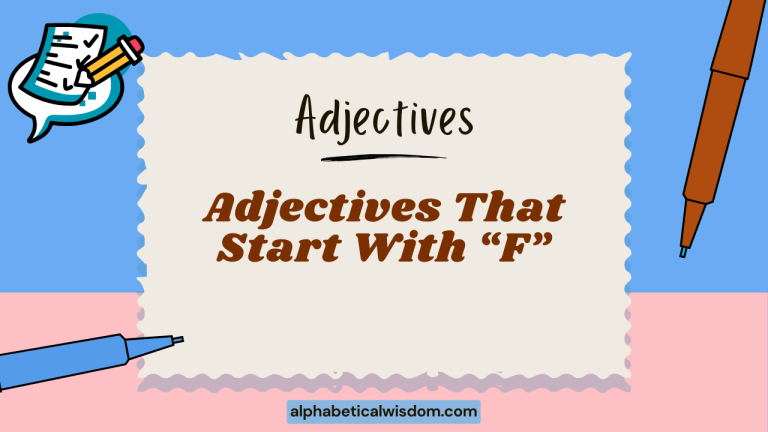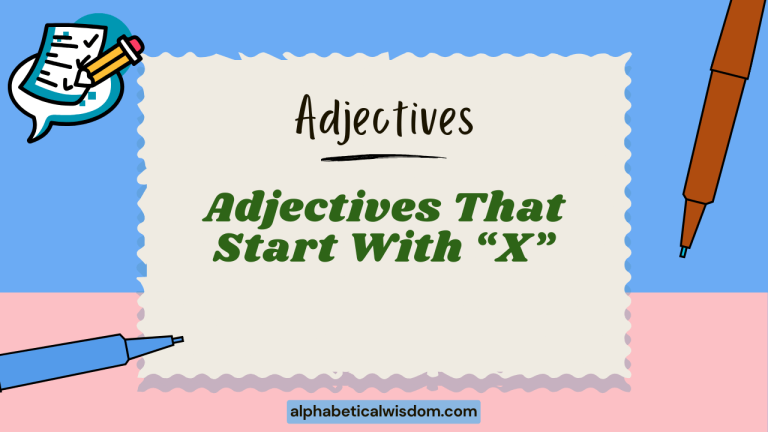Adjectives Starting With E: A Comprehensive Grammar Guide
Adjectives are essential components of the English language, enriching our descriptions and adding depth to our communication. Understanding adjectives, particularly those starting with specific letters, enhances vocabulary and improves writing skills.
This article focuses on adjectives that begin with the letter “E,” exploring their definitions, usage, and providing numerous examples. Whether you are a student, a non-native speaker, or simply someone looking to refine your English skills, this guide will offer valuable insights and practical exercises to master these descriptive words.
Table of Contents
- Introduction
- Definition of Adjectives
- Structural Breakdown
- Types and Categories of Adjectives Starting With E
- Examples of Adjectives Starting With E
- Usage Rules for Adjectives
- Common Mistakes
- Practice Exercises
- Advanced Topics
- FAQ
- Conclusion
Definition of Adjectives
An adjective is a word that modifies a noun or pronoun, providing more information about it. Adjectives describe qualities, characteristics, or states of being. They answer questions like “What kind?”, “Which one?”, “How many?”, or “How much?”. Adjectives play a crucial role in creating vivid and detailed descriptions, making writing more engaging and informative. They are essential for conveying precise meanings and enhancing the reader’s understanding.
Adjectives can be classified based on their function. Descriptive adjectives provide details about the noun’s physical attributes or qualities. Quantitative adjectives specify the amount or number of the noun. Demonstrative adjectives indicate which noun is being referred to. Possessive adjectives show ownership. Understanding these classifications helps in using adjectives effectively and accurately.
Structural Breakdown
The structure of adjectives is relatively straightforward. Most adjectives can be used in two main positions: attributively and predicatively. When used attributively, the adjective comes before the noun it modifies (e.g., “an elegant dress”). When used predicatively, the adjective follows a linking verb such as “is,” “are,” “was,” or “were” and describes the subject of the sentence (e.g., “The dress is elegant“).
Adjectives can also be modified by adverbs to intensify or qualify their meaning. For example, in the phrase “extremely effective,” the adverb “extremely” modifies the adjective “effective,” enhancing its impact. Additionally, some adjectives can be formed by adding suffixes such as “-able,” “-ful,” “-less,” “-ous,” “-ive,” and “-ed” to nouns or verbs. This structural flexibility allows for a wide range of descriptive possibilities.
Types and Categories of Adjectives Starting With E
Adjectives starting with the letter “E” can be categorized based on their meaning and usage. These categories include descriptive, evaluative, emotional, and experiential adjectives.
Each category serves a distinct purpose in enhancing the clarity and richness of language.
Descriptive Adjectives
Descriptive adjectives provide detailed information about the physical characteristics, attributes, or qualities of a noun. They help create a clear and vivid image in the reader’s mind. Examples include “early,” “easy,” “elastic,” and “empty.” These adjectives describe the specific properties of the noun they modify.
Evaluative Adjectives
Evaluative adjectives express a judgment or opinion about the noun. They indicate whether something is good or bad, useful or useless, important or unimportant. Examples include “effective,” “efficient,” “excellent,” and “essential.” These adjectives reflect the speaker’s or writer’s perspective on the noun.
Emotional Adjectives
Emotional adjectives describe feelings or states of mind. They convey the emotional state of a person or thing. Examples include “elated,” “envious,” “excited,” and “embarrassed.” These adjectives add depth and emotional resonance to descriptions.
Experiential Adjectives
Experiential adjectives relate to experiences or the process of experiencing something. They often describe the nature or quality of an experience. Examples include “educational,” “enjoyable,” “enriching,” and “excruciating.” These adjectives provide insight into the nature of the experience being described.
Examples of Adjectives Starting With E
To illustrate the usage of adjectives starting with “E,” the following sections provide comprehensive examples organized by category. These examples demonstrate how each type of adjective can be used in various contexts to enhance descriptions and convey precise meanings.
Descriptive Adjectives Examples
The following table provides examples of descriptive adjectives starting with “E” used in sentences. These examples showcase how these adjectives add detail and specificity to descriptions.
| Adjective | Example Sentence |
|---|---|
| Early | The early bird catches the worm. |
| Easy | This math problem is easy to solve. |
| Elastic | The waistband of these pants is very elastic. |
| Empty | The bottle is empty, so we need to refill it. |
| Even | The surface of the table is even and smooth. |
| Evergreen | The evergreen trees provide shade all year round. |
| Elegant | She wore an elegant dress to the party. |
| Edible | These berries are edible and safe to eat. |
| Elderly | The elderly woman needed help crossing the street. |
| Electric | The electric car is environmentally friendly. |
| Elite | He belongs to an elite group of athletes. |
| Eloquent | The speaker gave an eloquent speech. |
| Embarrassing | It was an embarrassing moment when I tripped. |
| Embryonic | The project is still in its embryonic stage. |
| Emerald | She had emerald green eyes. |
| Eminent | He is an eminent scholar in his field. |
| Empirical | The study is based on empirical evidence. |
| Endless | The possibilities seem endless. |
| Energetic | The energetic puppy loves to play. |
| Enormous | They live in an enormous house. |
| Entire | I ate the entire pizza by myself. |
| Environmental | Environmental protection is crucial. |
| Epic | The movie was an epic adventure. |
| Equal | Everyone should have equal opportunities. |
| Equatorial | The equatorial climate is hot and humid. |
| Equivalent | Two plus two is equivalent to four. |
| Erratic | His behavior was erratic and unpredictable. |
| Essential | Water is essential for survival. |
Evaluative Adjectives Examples
The following table provides examples of evaluative adjectives starting with “E” used in sentences. These examples demonstrate how these adjectives express judgments and opinions.
| Adjective | Example Sentence |
|---|---|
| Effective | This medicine is very effective against the cold. |
| Efficient | The new system is more efficient than the old one. |
| Excellent | She received an excellent grade on her exam. |
| Exceptional | His performance was exceptional. |
| Exclusive | This is an exclusive club for members only. |
| Exemplary | His conduct was exemplary. |
| Exquisite | The craftsmanship is exquisite. |
| Extravagant | They live an extravagant lifestyle. |
| Extreme | We faced extreme weather conditions. |
| Esteemed | He is an esteemed colleague. |
| Ethical | The company follows ethical business practices. |
| Evident | It was evident that she was upset. |
| Exact | Give me the exact measurements. |
| Expedient | It was an expedient solution to the problem. |
| Expensive | That car is very expensive. |
| Expert | He is an expert in his field. |
| Explicit | The instructions were very explicit. |
| Express | This is an express delivery service. |
| Extra | We have extra supplies in the storage room. |
| Essential | Communication is essential for a successful relationship. |
| Established | The company is a well-established brand. |
| Esteemed | He is an esteemed member of the community. |
| Eternal | The artist sought eternal fame through his works. |
| Evenhanded | The judge was known for his evenhanded rulings. |
| Evolutionary | The new model is an evolutionary improvement. |
| Exceptional | She demonstrated exceptional leadership skills. |
| Executive | He holds an executive position in the company. |
| Exhilarating | The roller coaster ride was exhilarating. |
Emotional Adjectives Examples
The following table provides examples of emotional adjectives starting with “E” used in sentences. These examples demonstrate how these adjectives convey feelings and states of mind.
| Adjective | Example Sentence |
|---|---|
| Elated | She was elated by the good news. |
| Envious | He felt envious of his friend’s success. |
| Excited | The children were excited about the trip. |
| Embarrassed | I felt embarrassed when I forgot her name. |
| Ecstatic | They were ecstatic about winning the game. |
| Edgy | He seemed edgy before the presentation. |
| Effusive | She gave an effusive welcome to the guests. |
| Empathetic | She has an empathetic understanding of others’ feelings. |
| Enamored | They were enamored with the beautiful scenery. |
| Enchanted | The audience was enchanted by the performance. |
| Engrossed | He was engrossed in the book. |
| Enlivened | The music enlivened the party. |
| Enraged | He was enraged by the injustice. |
| Entranced | She was entranced by the magic show. |
| Euphoric | He felt euphoric after finishing the marathon. |
| Eager | The students were eager to learn new things. |
| Earnest | He made an earnest attempt to apologize. |
| Easygoing | She has an easygoing personality. |
| Elevated | His spirits were elevated by the kind words. |
| Emboldened | He felt emboldened to speak his mind. |
| Empowered | The training program empowered the employees. |
| Encouraged | She felt encouraged by the positive feedback. |
| Endearing | He has an endearing smile. |
| Engaged | The audience was fully engaged during the lecture. |
| Enjoyable | The evening was very enjoyable. |
| Entertained | The children were entertained by the clown. |
| Enthralled | They were enthralled by the storyteller. |
| Enthusiastic | She is an enthusiastic supporter of the charity. |
Experiential Adjectives Examples
The following table provides examples of experiential adjectives starting with “E” used in sentences. These examples demonstrate how these adjectives describe the nature of experiences.
| Adjective | Example Sentence |
|---|---|
| Educational | The museum visit was very educational. |
| Enjoyable | The concert was an enjoyable experience. |
| Enriching | Volunteering is an enriching experience. |
| Excruciating | The pain was excruciating after the surgery. |
| Eye-opening | Traveling to a new country can be an eye-opening experience. |
| Exhausting | The hike was exhausting but rewarding. |
| Exhilarating | Skydiving is an exhilarating adventure. |
| Emotional | Watching the movie was an emotional experience. |
| Enlightening | The lecture was very enlightening. |
| Engaging | The workshop was very engaging and interactive. |
| Epicurean | They enjoyed an epicurean dining experience. |
| Escapist | Reading novels can provide an escapist experience. |
| Essential | Learning a new language is an essential skill. |
| Ethical | Participating in fair trade is an ethical choice. |
| Evocative | The music was very evocative, bringing back memories. |
| Evolutionary | The company’s growth was an evolutionary process. |
| Exceptional | The service at the hotel was exceptional. |
| Exemplary | His behavior was exemplary during the crisis. |
| Exhaustive | They conducted an exhaustive investigation. |
| Expanding | Traveling can be an expanding experience. |
| Experimental | The chef tried an experimental dish. |
| Exploratory | The mission was an exploratory expedition. |
| Expressive | Art can be a very expressive medium. |
| Extensive | The library has an extensive collection of books. |
| Extraordinary | Witnessing the aurora borealis was an extraordinary sight. |
| Exuberant | The children showed exuberant joy at the party. |
| Empowering | The workshop was an empowering experience for all participants. |
| Enduring | The concert was an enduring experience, remembered for years later. |
Usage Rules for Adjectives
Adjectives generally precede the nouns they modify (attributive use). However, they follow linking verbs such as “be,” “seem,” “become,” and “appear” (predicative use). Coordinate adjectives, which are adjectives that equally modify the same noun, are separated by commas (e.g., “a tall, handsome man”). Cumulative adjectives, which build upon each other to modify the noun, do not require commas (e.g., “a small wooden box”).
When using multiple adjectives, the order generally follows a pattern: opinion, size, age, shape, color, origin, material, and purpose. For example, “a beautiful large old round blue Italian leather bag.” Understanding this order can improve the clarity and flow of writing. However, it’s important to note that native speakers often rely on intuition and ear when ordering adjectives, so flexibility is key.
Common Mistakes
One common mistake is using adjectives as adverbs, or vice versa. For example, saying “He runs quick” instead of “He runs quickly.” Another frequent error is misusing comparative and superlative forms. Remember to use “-er” and “more” for comparing two things, and “-est” and “most” for comparing three or more things. Additionally, avoid using double comparatives or superlatives (e.g., “more better,” “most best”).
Another common error involves the incorrect placement of adjectives in a sentence, which can lead to ambiguity or confusion. For instance, “Only I saw the cat” is different from “I saw only the cat.” The first sentence suggests that no one else saw the cat, while the second indicates that I saw only the cat, and nothing else.
Precise placement ensures the intended meaning is conveyed accurately.
| Incorrect | Correct |
|---|---|
| He felt badly. | He felt bad. |
| This is the most best option. | This is the best option. |
| She is more taller than me. | She is taller than me. |
| I need a quickly answer. | I need a quick answer. |
Practice Exercises
Test your understanding of adjectives starting with “E” with the following exercises. Identify the correct adjective to use in each sentence and rewrite the sentence with the adjective in the appropriate position.
- The ______ student always completes his homework on time. (eager, easily)
- She wore an ______ dress to the party. (elegant, elegantly)
- This is an ______ opportunity to learn new skills. (excellent, excellently)
- The ______ painting was displayed in the museum. (emotional, evocative)
- The ______ child was excited about the trip. (energetic, energy)
- The ______ solution helped solve the problem quickly. (effective, effect)
- He gave an ______ speech that moved the audience. (eloquent, eloquence)
- The ______ landscape stretched out before them. (endless, end)
- The _______ design of the building was admired by all. (elaborate, elaborately)
- The _______ task required great care and attention. (exacting, exactly)
Answer Key:
- The eager student always completes his homework on time.
- She wore an elegant dress to the party.
- This is an excellent opportunity to learn new skills.
- The evocative painting was displayed in the museum.
- The energetic child was excited about the trip.
- The effective solution helped solve the problem quickly.
- He gave an eloquent speech that moved the audience.
- The endless landscape stretched out before them.
- The elaborate design of the building was admired by all.
- The exacting task required great care and attention.
Exercise 2: Fill in the Blanks
Fill in the blanks with the most appropriate adjective starting with the letter “E.”
- The company is committed to using _______ sources of energy.
- The witness provided _______ details about the crime.
- She felt _______ when she received the award.
- The old house had an _______ charm.
- He is an _______ professor of history.
- The medicine proved to be _______ in relieving the pain.
- The _______ summer days were perfect for swimming.
- The task required an _______ amount of patience.
- The _______ forests are home to many species of wildlife.
- The speaker delivered an _______ presentation that captivated the audience.
Answer Key:
- The company is committed to using environmental sources of energy.
- The witness provided exact details about the crime.
- She felt elated when she received the award.
- The old house had an eternal charm.
- He is an eminent professor of history.
- The medicine proved to be effective in relieving the pain.
- The endless summer days were perfect for swimming.
- The task required an enormous amount of patience.
- The evergreen forests are home to many species of wildlife.
- The speaker delivered an eloquent presentation that captivated the audience.
Exercise 3: Sentence Construction
Create your own sentences using the following adjectives starting with the letter “E.”
- Easy
- Elegant
- Excellent
- Emotional
- Energetic
- Effective
- Eloquent
- Endless
- Elaborate
- Exacting
Sample Answer:
- The test was surprisingly easy.
- She looked elegant in her new dress.
- He received an excellent score on the exam.
- The movie was an emotional rollercoaster.
- The energetic children ran around the park.
- This new method is more effective than the old one.
- The lawyer gave an eloquent closing statement.
- The possibilities seemed endless.
- The cake was decorated with elaborate designs.
- Baking requires an exacting adherence to the recipe.
Advanced Topics
For advanced learners, exploring the nuances of adjective order and the use of compound adjectives can further refine their understanding. Compound adjectives are formed by combining two or more words, often hyphenated, to act as a single adjective (e.g., “well-known author,” “state-of-the-art technology”). Mastering the formation and usage of compound adjectives adds sophistication to writing.
Another advanced topic is the use of limiting adjectives, which specify a particular characteristic or quantity of the noun. These include articles (a, an, the), demonstrative adjectives (this, that, these, those), and possessive adjectives (my, your, his, her, its, our, their). Understanding how limiting adjectives function within a sentence is crucial for precise communication. Furthermore, studying the etymology and historical development of adjectives can provide deeper insights into their meanings and usages.
FAQ
- What is the difference between an adjective and an adverb?
An adjective modifies a noun or pronoun, while an adverb modifies a verb, adjective, or another adverb. Adjectives describe qualities or characteristics, whereas adverbs describe how, when, where, or to what extent an action is performed.
- Can an adjective modify another adjective?
No, an adjective cannot directly modify another adjective. Instead, adverbs are used to modify adjectives. For example, “very beautiful” – here, “very” is an adverb modifying the adjective “beautiful.”
- What is the correct order of adjectives in a sentence?
The general order is: opinion, size, age, shape, color, origin, material, and purpose. However, this is a guideline, and native speakers often rely on intuition. The most important thing is clarity and natural-sounding phrasing.
- How do I use comparative and superlative adjectives correctly?
Use the comparative form (ending in “-er” or preceded by “more”) when comparing two things. Use the superlative form (ending in “-est” or preceded by “most”) when comparing three or more things. Avoid double comparatives or superlatives.
- What are some common mistakes to avoid when using adjectives?
Common mistakes include using adjectives as adverbs, misusing comparative and superlative forms, and incorrect placement of adjectives in a sentence. Always double-check for these errors to ensure clarity.
- Are there any adjectives that can function as nouns?
Yes, some adjectives can function as nouns, especially when referring to groups of people (e.g., “the poor,” “the rich,” “the elderly”). In these cases, the adjective acts as a collective noun.
- How can I improve my vocabulary of adjectives?
Read widely, pay attention to how adjectives are used in context, and use a thesaurus to find synonyms for adjectives you already know. Practice using new adjectives in your writing and speaking.
- What is the difference between attributive and predicative adjectives?
An attributive adjective comes before the noun it modifies (e.g., “a beautiful flower”). A predicative adjective follows a linking verb and describes the subject (e.g., “The flower is beautiful”).
- How do you form compound adjectives?
Compound adjectives are usually formed by combining two or more words with a hyphen (e.g., “well-known,” “state-of-the-art”). These words function as a single adjective modifying the noun.
- How can I ensure that my use of adjectives is effective in my writing?
Choose adjectives that are specific and vivid, and that add meaningful detail to your descriptions. Avoid using too many adjectives in a single sentence, as this can make your writing sound cluttered. Vary your adjective choices to keep your writing engaging.
Conclusion
Mastering adjectives, particularly those starting with the letter “E,” is crucial for effective communication and enhanced writing skills. This guide has provided a comprehensive overview of adjectives, their structural elements, and various categories, along with numerous examples and practice exercises.
By understanding the usage rules and avoiding common mistakes, learners can confidently incorporate these descriptive words into their vocabulary.
Remember to practice regularly and pay attention to how adjectives are used in different contexts. With consistent effort and a keen eye for detail, you can significantly improve your English grammar and writing abilities.
Continue to explore and expand your vocabulary to express yourself more clearly and vividly.
